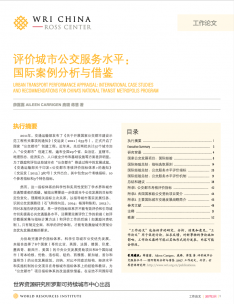Urban Transport Performance Appraisal: International Case Studies and Recommendations for China’s National Transit Metropolis Program
China's National Transit Metropolis Demonstration Program rolled out in late 2011 in the context of "double" reform on both supporting policies and institutions of the Ministry of Transport. This program selected 37 pilot cities to develop public transport as their urban development priorities, through a spectrum of planning, construction, land use, right of way, finance and tax policies. To track and evaluate the development achievements of these cities, the Ministry of Transport has issued the Notice of "Transit Metropolis Assessment System" (Jiaoyunfa [2013] No. 387) in 2013. As the appraisal of “Transit Metropolis” program is growing to be more "standardized and unified", the Key Performance Indicators (KPIs) have played an important guiding role in the process.
Nonetheless, this KPI system is widely denounced for its inadequacy to guide the city-level implementation. To be specific, the KPI system has laid too much emphasis on the transit mode share indicator and is misguided in setting development goals and finding countermeasures because of its inflexibility to accommodate cities at different development stages. Meanwhile, the KPI system itself isn’t enough to effectively evaluate and enhance city public transport level of service. Its upstream work (such as data collection, indicator calculation) and downstream work (such as accountability mechanisms) also require further improvement. Therefore, setting up a scientific and comprehensive KPI management system is an important step for governments to keep program work-in-process and realize its sustainable development target.

Drawing on the existing literature on different national transit investment programs abroad (Colombia, Britain, France, Germany, India, Mexico, New Zealand, the United States) and city-wide performance management systems (Copenhagen, London, Los Angeles, New York, Seattle, Singapore, Seoul and Vancouver), the study reveals the drawbacks of the KPI system that are narrowly-focus, incomplete, and misguided. And the study proposes recommendations in following three categories to further improve the KPI system.
First, the KPI system needs to establish and articulate clear vision, boundaries and proposition, changing from a narrow focus on transit performance to be multi-dimensional. Second, the KPIs should be stakeholder-targeted, broad in performance review and flexible to accommodate different cities. Last but not least, improving the KPI system also requires input on setting up regular project monitoring and evaluation, stringent data collection protocols, and reasonable accountability mechanisms.
Projects

Sustainable Mobility
Visit ProjectSustainable Mobility Project aims to contribute to the development of low-carbon transportation in China, and build a green, efficient, inclusive and resilient urban mobility system.
Part of Sustainable Cities